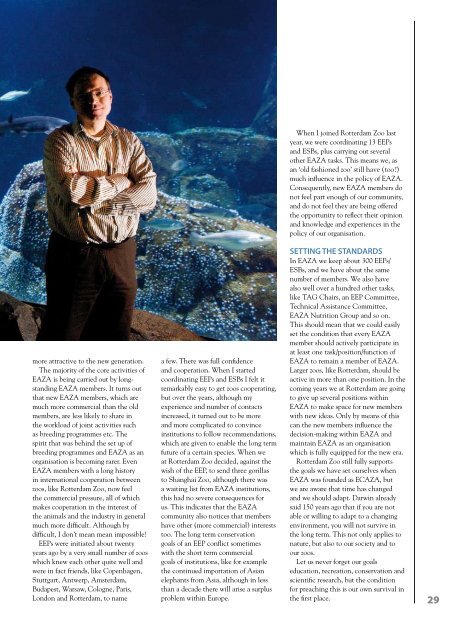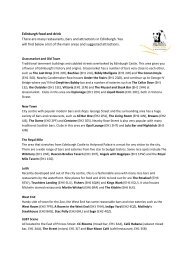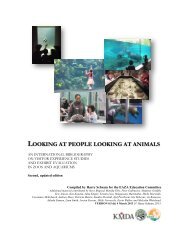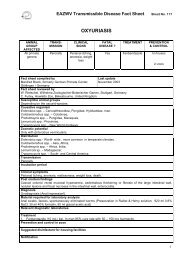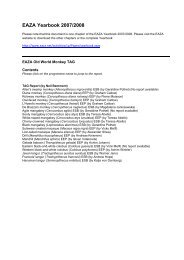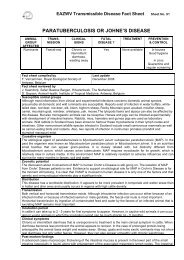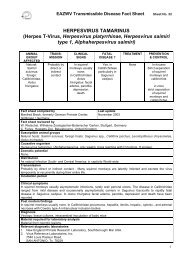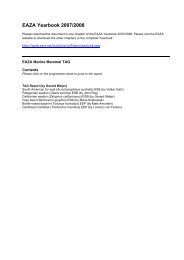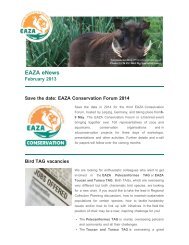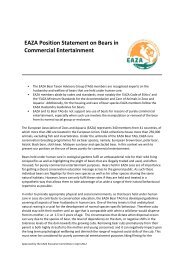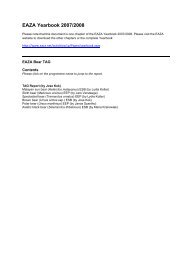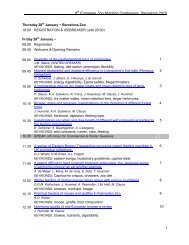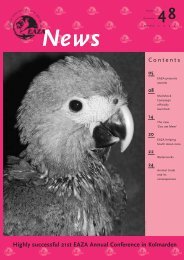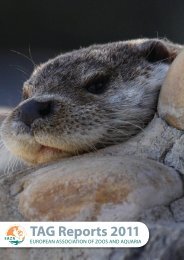Spring 2010 - European Association of Zoos and Aquaria
Spring 2010 - European Association of Zoos and Aquaria
Spring 2010 - European Association of Zoos and Aquaria
Create successful ePaper yourself
Turn your PDF publications into a flip-book with our unique Google optimized e-Paper software.
more attractive to the new generation.<br />
The majority <strong>of</strong> the core activities <strong>of</strong><br />
EAZA is being carried out by longst<strong>and</strong>ing<br />
EAZA members. It turns out<br />
that new EAZA members, which are<br />
much more commercial than the old<br />
members, are less likely to share in<br />
the workload <strong>of</strong> joint activities such<br />
as breeding programmes etc. The<br />
spirit that was behind the set up <strong>of</strong><br />
breeding programmes <strong>and</strong> EAZA as an<br />
organisation is becoming rarer. Even<br />
EAZA members with a long history<br />
in international cooperation between<br />
zoos, like Rotterdam Zoo, now feel<br />
the commercial pressure, all <strong>of</strong> which<br />
makes cooperation in the interest <strong>of</strong><br />
the animals <strong>and</strong> the industry in general<br />
much more difficult. Although by<br />
difficult, I don’t mean mean impossible!<br />
EEPs were initiated about twenty<br />
years ago by a very small number <strong>of</strong> zoos<br />
which knew each other quite well <strong>and</strong><br />
were in fact friends, like Copenhagen,<br />
Stuttgart, Antwerp, Amsterdam,<br />
Budapest, Warsaw, Cologne, Paris,<br />
London <strong>and</strong> Rotterdam, to name<br />
a few. There was full confidence<br />
<strong>and</strong> cooperation. When I started<br />
coordinating EEPs <strong>and</strong> ESBs I felt it<br />
remarkably easy to get zoos cooperating,<br />
but over the years, although my<br />
experience <strong>and</strong> number <strong>of</strong> contacts<br />
increased, it turned out to be more<br />
<strong>and</strong> more complicated to convince<br />
institutions to follow recommendations,<br />
which are given to enable the long term<br />
future <strong>of</strong> a certain species. When we<br />
at Rotterdam Zoo decided, against the<br />
wish <strong>of</strong> the EEP, to send three gorillas<br />
to Shanghai Zoo, although there was<br />
a waiting list from EAZA institutions,<br />
this had no severe consequences for<br />
us. This indicates that the EAZA<br />
community also notices that members<br />
have other (more commercial) interests<br />
too. The long term conservation<br />
goals <strong>of</strong> an EEP conflict sometimes<br />
with the short term commercial<br />
goals <strong>of</strong> institutions, like for example<br />
the continued importation <strong>of</strong> Asian<br />
elephants from Asia, although in less<br />
than a decade there will arise a surplus<br />
problem within Europe.<br />
When I joined Rotterdam Zoo last<br />
year, we were coordinating 13 EEPs<br />
<strong>and</strong> ESBs, plus carrying out several<br />
other EAZA tasks. This means we, as<br />
an ‘old fashioned zoo’ still have (too?)<br />
much influence in the policy <strong>of</strong> EAZA.<br />
Consequently, new EAZA members do<br />
not feel part enough <strong>of</strong> our community,<br />
<strong>and</strong> do not feel they are being <strong>of</strong>fered<br />
the opportunity to reflect their opinion<br />
<strong>and</strong> knowledge <strong>and</strong> experiences in the<br />
policy <strong>of</strong> our organisation.<br />
SETTING THE STANDARDS<br />
In EAZA we keep about 300 EEPs/<br />
ESBs, <strong>and</strong> we have about the same<br />
number <strong>of</strong> members. We also have<br />
also well over a hundred other tasks,<br />
like TAG Chairs, an EEP Committee,<br />
Technical Assistance Committee,<br />
EAZA Nutrition Group <strong>and</strong> so on.<br />
This should mean that we could easily<br />
set the condition that every EAZA<br />
member should actively participate in<br />
at least one task/position/function <strong>of</strong><br />
EAZA to remain a member <strong>of</strong> EAZA.<br />
Larger zoos, like Rotterdam, should be<br />
active in more than one position. In the<br />
coming years we at Rotterdam are going<br />
to give up several positions within<br />
EAZA to make space for new members<br />
with new ideas. Only by means <strong>of</strong> this<br />
can the new members influence the<br />
decision-making within EAZA <strong>and</strong><br />
maintain EAZA as an organisation<br />
which is fully equipped for the new era.<br />
Rotterdam Zoo still fully supports<br />
the goals we have set ourselves when<br />
EAZA was founded as ECAZA, but<br />
we are aware that time has changed<br />
<strong>and</strong> we should adapt. Darwin already<br />
said 150 years ago that if you are not<br />
able or willing to adapt to a changing<br />
environment, you will not survive in<br />
the long term. This not only applies to<br />
nature, but also to our society <strong>and</strong> to<br />
our zoos.<br />
Let us never forget our goals<br />
education, recreation, conservation <strong>and</strong><br />
scientific research, but the condition<br />
for preaching this is our own survival in<br />
the first place.<br />
29


